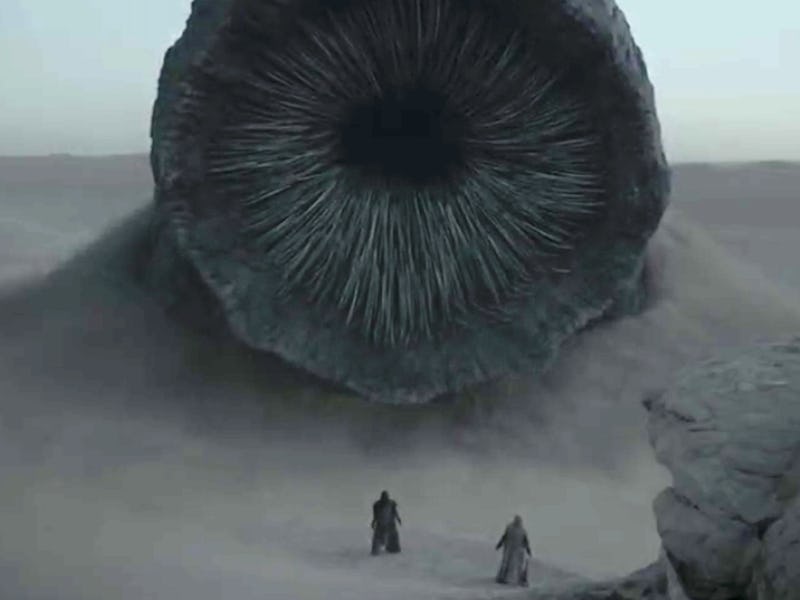Why the Dune 2021 delay could be better for the sequels
If Dune had come out this year, it might have been a disaster.

For those of us looking forward to ending 2020 with a brand-new cinematic science-fiction epic, the news that Denis Villeneuve's Dune would be delayed until 2021 was a pretty big letdown. Just weeks after the first trailer for Dune got us all fired-up, the news came that we'd all have to wait a year to finally see those sandworms rise.
But, maybe this delay is good for Dune. Or, more specifically, maybe the long wait is better for the success of the first movie. After all, if Dune had tanked, there would be no chance of any new Dune sequels.
Here's why the delay of Dune might be the best thing that could have happened — and might ensure that we'll get several more sequels in the series over the next ten years.
'Dune' (2021).
Had Dune stuck to its theatrical release date of December 2020, and had subsequently tanked the box office, there would have been no clear reason as to why. Sure, conventional wisdom would have said that Dune tanking in 2020 was because of the Covid-19 pandemic. People who would have wanted to see Dune didn't, and therefore the movie — in this hypothetical— would have lost money.
The problem with that hypothetical situation is that a 2020 Dune might have still lost money even if there had been no Covid-19. In fact, it's possible, that even in a potentially rosy 2021, Dune could still flop. Any big blockbuster can flop.
But what's relevant in the case of Dune is that the original 1984 Lynch film was a box office failure and Denis Villeneuve's last big sci-fi epic — Blade Runner 2049 – was also a massive box office bomb. Keep in mind: Blade Runner 2049 was a movie that starred Ryan Gosling and Harrison Ford and it came out two years after The Force Awakens and one year after La La Land; films that respectively, were movies in which Ford and Gosling were universally praised. So Blade Runner 2049 didn't flop because of star power. It flopped because the appetite for a Blade Runner sequel was largely overestimated. The original Blade Runner also flopped in 1982, just like Dune in 1984.
This isn't to say that any of these movies are bad. That's not really the point. But if you want your sci-fi/fantasy franchise to succeed, the movies have to make money. And with something like Dune, where you could potentially have like five or more movie sequels, everyone involved needs to make sure they're betting on a winning sandworm.
The sandworm in 'Dune' 1984.
Why the delay might have saved Dune
Because Dune is now expected to come out in October 2021, any potential confusion as to why it might have underperformed at the box office in December 2020 is gone. This also gives team-Dune an entire year to build-up awareness about the franchise and get people psyched for a fall movie that will feel, in essence, like a summer movie.
Because of so many movie delays, 2021 is shaping up to be the year that movie theaters make a comeback. If the new 2021 release date for No Time To Die kicks off a successful movie season, then Dune will be like the icing on the cake. People will go see it because they've been hearing about it for a year and change, and several other movies have already come out and done just fine. Basically, this puts Dune on a level playing field with other movies.
Why the delay might make the movie better
In very recent interviews — before the delay was announced or even finalized — director Villeneuve straight-up said that completing the post-production and editing process of Dune to meet the December 2020 release date was going to be hard. In August 2020, he said: "It will be a sprint to finish the movie on time right now."
Remember what happened last time a highly-anticipated sci-fi blockbuster movie was sprinting to finish on time? Yes. You do. That movie was called The Rise of Skywalker. There's no world in which a movie like The Rise of Skywalker or Dune would have been made better with a little more time. So, an October 2021 release date almost certainly means the quality, cohesiveness, and artistry of Dune will be intact.
For Jason Mamoa, 'Dune' could be bigger than 'Aquaman.'
Any sequels stand a better chance of happening now
Pushing Dune to 2021 clearly gives it a better chance of being successful on its own merits. But beyond just this movie, there could be the seeds of a large franchise. The first three Frank Herbert-penned Dune novels span two generations of characters, while the latter three span several thousand years beyond that. If we're going to see any movie versions of these sequels, then the first movie needs to create that demand. If Dune is going to become the next Lord of the Rings – at least as far as mainstream movies are concerned – then it needs to have that spice flowing right out of the gate.
In the Dune novels, meticulous planning and scheming is the only way anyone gets anything done. For the new Dune movies to become hits, an equal amount of patience might be required.
Dune is now expected in theaters on October 1, 2021.
This article was originally published on